The anticipation surrounding the opening of the downtown duty-free mall in Colombo has given way to frustration as officials express concerns over unexpected delays. Originally slated for an April inauguration, the facility’s debut is now shrouded in uncertainty, primarily due to unforeseen legislative obstacles.
Among the issues at hand are apprehensions regarding the potential ramifications of the duty-free mall on local enterprises and Sri Lanka’s taxation structure. Despite these concerns, Thulchi Aluwihare, Deputy Managing Director of CHEC Port City Colombo, remains steadfast in his assertion that the mall’s impact will not align with the negative projections put forth by some in the political and business spheres.
Aluwihare emphasizes that the mall’s objective is not to undermine local businesses but rather to broaden the market and stimulate economic development. He underscores the broader vision of Port City, which aims to bolster foot traffic and bolster the entire Colombo ecosystem.
In response to fears of market cannibalization and goods leakage, Aluwihare assures that stringent measures are in place to safeguard against such occurrences. The focus, he emphasizes, is on enticing tourists and positioning Sri Lanka as a premier shopping destination, leveraging the average tourist’s week-long stay with just a single day spent shopping in Colombo.
However, the persistent delays are not merely a logistical inconvenience; they are also perceived as a detrimental signal to investors, both current and prospective. Aluwihare stresses the importance of fostering investor-friendly processes, particularly in a climate where foreign direct investment and capital are pivotal to address Sri Lanka’s balance of payments crisis.
In essence, the impasse surrounding the duty-free mall underscores broader challenges facing Sri Lanka’s economic landscape. While the aspiration for economic revitalization is clear, navigating the complexities of legislation and stakeholder concerns proves to be a formidable task. As stakeholders continue to grapple with these hurdles, the imperative remains clear: fostering an environment conducive to investment and sustainable growth.


